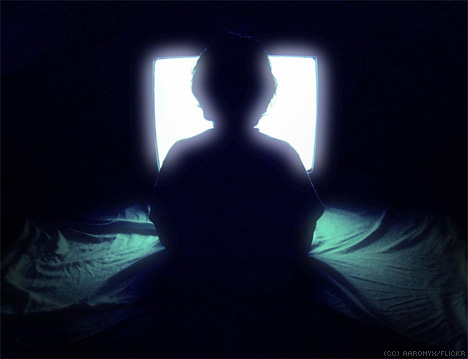Child Anxiety and Watching Television

It is no revelation to hear that television plays a significant role in a child’s development. How much of a role and what effect it has depends on the amount of television children watch and which programs they watch. And because of the violent and frightening nature of many TV shows, how good children are at coping plays an important role as well.
According to a random national survey in the Netherlands, a third of the children between the ages of 7 and 12 reported that they had been frightened by TV in the preceding year (Valkenburg, Cantor & Peeters, 2000). Another survey of children in grades 3 through 8 demonstrated a positive correlation between number of hours of TV viewing and the prevalence of depression, anxiety and posttraumatic stress symptoms (M.I. Singer, Slovak, Frierson, & York, 1998).
In addition, watching a lot of television makes it challenging for children to distinguish between reality and fantasy, truth and fiction. For example, while actual crime has decreased, coverage of crime has increased by 240% thanks to 24 hour news networks and the internet (AACAP, 2002).
This discrepancy between TV and reality can make children believe that they will become victims of robberies, kidnappings, and violent crimes. This, in turn, can increase children’s anxiety or even serve as one of the many causes of their anxiety.
Surveys and statistics like these are certainly not encouraging. And the ubiquity of television makes it all the more difficult to regulate your child’s viewing habits. So what can you do?
First, on school nights, restrict your child’s television watching to one hour or less. Have your child only sit down to watch a specific show so he doesn’t flip around and see something violent or scary.
Secondly, closely monitor your child for any negative effects from television watching. Check your child for signs of bedwetting, crying, sleeplessness and any other symptoms of anxiety. If you notice any unusual or unhealthy behavior, sit down with your child and have a conversation with her. Ask her exactly what’s bothering her and find out what program she watched. If it was a scripted television show, reassure your child that it was not real. If your child happened to watch a violent or scary news story, reassure her that she is safe and sound.
Lastly, to help your child avoid the temptation to mindlessly watch hours of television, encourage him to sign up for after school sports or activities. Social interaction is an excellent way to reduce anxiety and boost your child’s confidence.
Chris Nicoletti is a writer for GoZen.com, a site focused on alleviating the epidemic of childhood anxiety.